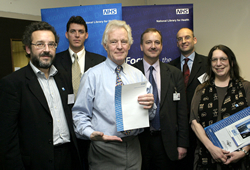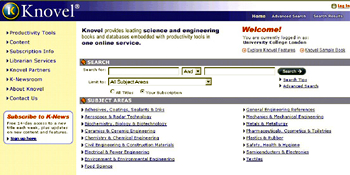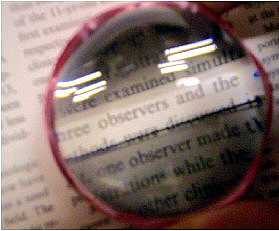
The newsletter of UCL Library Services Issue 15: Summer 2005
News items:
With exams looming, being able to make effective use of the UCL family of Libraries is more important than ever. You should always ask Issue Desk Staff if you are unsure or have concerns about your borrowing account. To try to help you through the stress, here are three tips on successful use of the library:
1. Check your Library Account at least once a week
 Books and other items are more likely to be recalled by other library users during the exam period so it is important that you check your library account regularly to make sure you know when your books are due for return. You can do this on-line through the Library Catalogue.
From the catalogue, click on the "User Information" option of the menu bar. You will then be asked for the barcode from the back of your ID card and a Library PIN. If you do not have your PIN, please visit any Library Issue Desk, where staff will be happy to set this up. After logging in, you will notice that the screen's colour scheme changes and you are given a list of options. Select "loans" and you will see a screen like the one above, which tells you what items you have and when they are due back. One of the example items above is marked "effective due date". This means that this item has been recalled and is due back by the revised date shown. You can also renew books from here using the "renew all" option in the top left, provided your books are all in date and that the book you need to renew is not recalled.
Books and other items are more likely to be recalled by other library users during the exam period so it is important that you check your library account regularly to make sure you know when your books are due for return. You can do this on-line through the Library Catalogue.
From the catalogue, click on the "User Information" option of the menu bar. You will then be asked for the barcode from the back of your ID card and a Library PIN. If you do not have your PIN, please visit any Library Issue Desk, where staff will be happy to set this up. After logging in, you will notice that the screen's colour scheme changes and you are given a list of options. Select "loans" and you will see a screen like the one above, which tells you what items you have and when they are due back. One of the example items above is marked "effective due date". This means that this item has been recalled and is due back by the revised date shown. You can also renew books from here using the "renew all" option in the top left, provided your books are all in date and that the book you need to renew is not recalled.
2. Use the advance booking system for short loans
 The short loan (3 hour and 2 day) materials that make up the Issue Desk and teaching collections (the photocopies of important readings) are the key items used to support the teaching of your classes at UCL. As they are so important, they are in high demand and may be difficult to get hold of, despite the short loan periods. Advanced bookings are the answer.
To place an advance booking, you will need your ID card, your Library PIN and access to the Library Catalogue. Find the short loan item you want on the catalogue and click on the link which says "request". Once you have entered your barcode and PIN, the computer will take you to a screen like the one below. From here, select which time slot you would like and click the corresponding link. Bookings last for one hour so that items can be available for others if they are not collected within the hour. This means that a booking for the 1600 slot will run out at 1700. You can book up to three items at a time.
The short loan (3 hour and 2 day) materials that make up the Issue Desk and teaching collections (the photocopies of important readings) are the key items used to support the teaching of your classes at UCL. As they are so important, they are in high demand and may be difficult to get hold of, despite the short loan periods. Advanced bookings are the answer.
To place an advance booking, you will need your ID card, your Library PIN and access to the Library Catalogue. Find the short loan item you want on the catalogue and click on the link which says "request". Once you have entered your barcode and PIN, the computer will take you to a screen like the one below. From here, select which time slot you would like and click the corresponding link. Bookings last for one hour so that items can be available for others if they are not collected within the hour. This means that a booking for the 1600 slot will run out at 1700. You can book up to three items at a time.
3. Use other libraries to boost your borrowing and find materials that are unavailable at UCL
Which libraries you are able to use and whether you are able to borrow from them
depends on the particular library and whether you are a Ph.D / MPhil, an MA,
MSci or MRes or an Undergraduate. Further details can be found at www.ucl.ac.uk/Library/otheraccess.shtml
but you should always check local conditions with the library you plan to visit
before you go. UCL degree level students are able to register for borrowing access
at Senate House Library, in the University of London building on Malet Street,
upon production of valid ID (session card and photocard). This borrowing is in
addition to your quota at UCL. The collections of the Senate House Library complements,
and in some cases duplicate, those here, so if you cannot find something at UCL,
there is a good chance Senate House may have it. (Search the Senate House
Catalogue).
"Knowledge is at the centre of good clinical care, and the application of what we know will make a bigger difference to healthcare and disease in the next decade than any drugs".
With these words, Dr Muir Gray (Secretary to the NHS National Knowledge Service and Director of Clinical Knowledge, Process and Safety for the NHS National Programme for IT) introduced the launch of the National Library for Health (NLH). The event took place at the Royal Free Medical Library, at the Hampstead Campus of the Royal Free and University College Medical School (RFUCMS) and was attended by over 70 people including librarians and information suppliers, as well as local Hospital and Medical School representatives.
The National Library for Health offers a dedicated portal for clinicians, providing access to the best current knowledge to support healthcare-related decisions. The web site is the first phase in the development of the NLH, which aims to bring together national resources including the NeLH (National electronic Library for Health), the National Core Content programme and regional and local collections.
The National Library for Health includes:
- A directory of available resources;
- A single search environment and web-based search engine;
- News services from trusted sources including NICE (National Institute for Clinical Excellence), Drug Info Zone and Health Technology Assessment reports via RSS (Really Simple Syndication) feeds;
- A pilot question answering service for Primary Care;
- A mental health e-books collection, comprising over 200 mental health e-books from publishers such as Taylor & Francis, Wiley and Springer.
|
 |
The Royal Free Medical Library was chosen to host the launch event because of strong links with the NLH through two projects:
The NeLH Specialist Library for Gastroenterology and Liver Diseases
In the first project, Dr Martyn Caplin, Consultant in Gastroenterology and Hepatobiliary Medicine at the Royal Free Hampstead NHS Trust, is heading a team including information specialists from the Medical Library which has successfully bid to develop and maintain a Specialist Library for Gastroenterology and Liver Diseases.
This Specialist Library will form part of the NLH alongside similar libraries for other specialties, each providing online portals to subject specific knowledge. Under the direction of a Clinical Lead and Editorial Board, a Specialist Library is populated with relevant, current and quality information and aims to bring the healthcare community together around topics of mutual interest and value.
The Map of Medicine
The second project is the Map of Medicine, an innovative clinical knowledge framework created at the RFUCMS and the Royal Free Hampstead NHS Trust. The Map of Medicine has been developed by Medic-to-Medic, a subsidiary of UCL BioMedica Plc, the wholly-owned investment fund of UCL responsible for technology transfer and other commercial initiatives arising from biomedical research at UCL. The Map is based on contributions from more than 250 clinicians across the Royal Free Hampstead NHS Trust and is supported by the Medical Library's Knowledge Resources Librarian.
Clinical knowledge is organised into more than 300 patient 'journeys' that 'map' clinical process throughout the healthcare system, starting from initial patient presentation in the GP surgery or the accident and emergency unit. Sample pathways and further information about the Map can be seen at http://www.mapofmedicine.co.uk/.
Betsy Anagnostelis, Librarian, Royal Free Medical Library.
 Top of page Top of page
Library Services has recently arranged a subscription to Knovel, making a wide range of new resources available to UCL Staff and Students. Knovel is a cross-searchable, interactive database and ebook provider. It contains 650 full-text science and engineering publications and includes tables, graphs and equations which can be manipulated and exported. The Advanced Search includes the option to search for the physical constants and structural properties of compounds and materials. Knovel has the potential to answer complex science and engineering questions quickly and easily, allowing more efficient use of time and resources.
Knovel covers a wide range of applied science publications including major reference
and textbooks such as Perry's Chemical Engineers' Handbook, Patty's Toxicology
and Smithsonian Physical Tables. You can browse by title, search the whole collection
or just a chosen title by keyword. The collections are broken down into subject
areas which you can browse for available resources.
 Knovel contains interactive tables of physical, thermodynamic and other properties
of compounds and pure substances which allow you to search for and manipulate
information. Data can then be retrieved and exported into spreadsheets or other
applications. Further elements allow you to solve equations and display results
in the form of interactive graphs, such as the one shown, which you can manipulate
to illustrate comparisons. Knovel contains interactive tables of physical, thermodynamic and other properties
of compounds and pure substances which allow you to search for and manipulate
information. Data can then be retrieved and exported into spreadsheets or other
applications. Further elements allow you to solve equations and display results
in the form of interactive graphs, such as the one shown, which you can manipulate
to illustrate comparisons.
To access Knovel, go to http://www.knovel.com. At present, Knovel can only be accessed from on campus. Help is available by selecting the .Help Center. option from the Knovel home page, which has links to a Quick Reference Guide and a more detailed Help Guide. For further information and help with using Knovel contact Zelda Chatten on lib-sciteam@ucl.ac.uk.
Zelda Chatten, Senior Library Assistant, Subject Librarians' Group
 Top of page Top of page
The Library's survey on opening hours closed on 6th March 2005 after a record response. Over 5,000 UCL Staff and Students took the opportunity to make their views on library opening times known. These responses are now being examined to provide an accurate evaluation of the issues and facilities that are important to UCL Library Users and will form the basis for costed proposals which will be considered by UCL's Senior Management in the near future. A breakdown and analysis of these results will also be made publicly available in the next edition of Library News.
The survey's prize draw has also taken place. The winner, a second year Medical Student, received her prize of a 4th generation iPod from Janet Percival, Library Services Group Manager for Planning & Resources, in March.
Thank you to all respondents for taking the time to express your opinions. Your views are important and will be used to help the Library
become more effective in supporting teaching and learning at UCL.

UCL Library Services' support strategy for Users with a Disability
has just been reviewed, with a raft of new policies and facilities being made
available. Support services, such as fetches of physically inaccessible material,
extended loan periods and assistance with the cost of photocopying, are all
available to those who need them. Among the new facilities are a batch of handheld
magnification lenses, funded thanks to the generosity of the ALM London (Archives,
Libraries and Museums London) and their Disability Access Grant Programme of
2004-5. All UCL Library Services Issue Desks now have such equipment to support
the needs of visually impaired or dyslexic library users and they are available
on request from the Issue Desks. Also, physical access to the collections held
in the Main Library will soon receive a much needed boost with the installation
of a wheelchair-friendly lift to all floors as part of the refurbishment program.
Full details of what is available and how to get any support you may require
can be found on the webpage: http://www.ucl.ac.uk/Library/disabil.shtml.
Alternatively, please contact the Library's Disabled Users Officer, Matthew
Reynolds, at 020 76797110 or ucylmir@ucl.ac.uk to
arrange a confidential discussion of what adjustments may be required. Support
beyond the Library can be obtained from the UCL Disability Centre, whose contact
details are included on the above website and who can be reached at 020 76790100.
 Top of page Top of page
Last modified 26 April 2005
|

